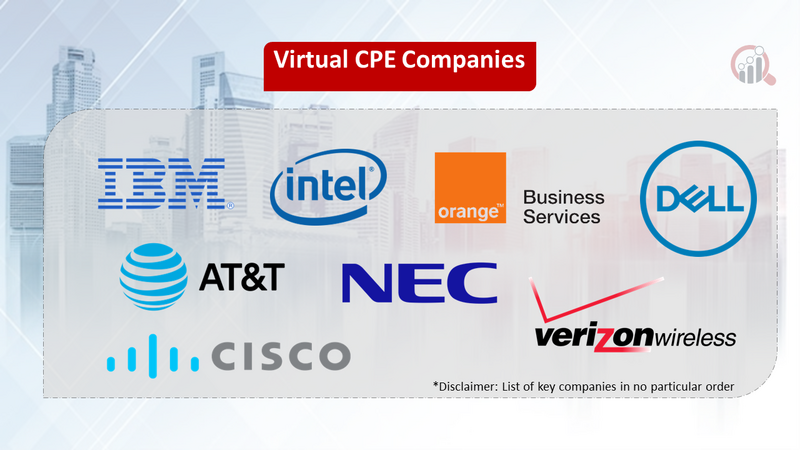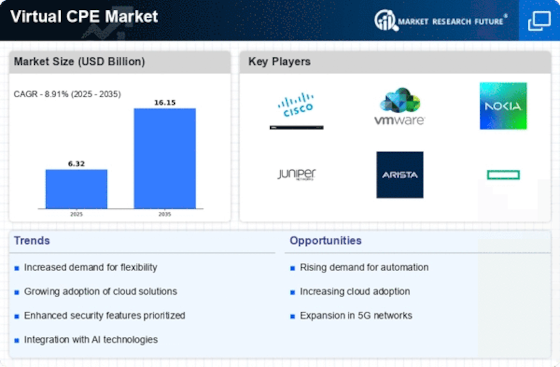Top Industry Leaders in the Virtual CPE Market

Competitive Landscape of the Virtual CPE Market: A Shifting Terrain
The virtual Customer Premises Equipment (vCPE) market is experiencing explosive growth, propelled by the digital transformation sweeping across industries. As organizations seek agility, scalability, and cost-efficiency, traditional hardware-based CPE solutions are giving way to virtualized alternatives. This dynamic landscape presents both potential and challenges for established players and aspiring entrants.
Key Players:
- Intel Corporation (U.S.)
- Qosmos (France)
- AT&T, Inc (U.S.)
- NEC Corporation (Japan)
- Orange Business Services (The Netherlands)
- Verizon Wireless (U.S.)
- Cisco Systems, Inc (U.S.)
- Ericsson AB (Sweden)
- International Business Machines Corporation (U.S.)
- Dell, Inc (U.S.).
- Target Audience
- Virtual CPE services providers
- Network Component providers
- Electronic Component Manufacturers
- Software Developers
- Government Agencies
- Electronic Device Manufacturers
- Value-Added Resellers
- Security agencies
Factors for Market Share Analysis:
-
Product Portfolio: Breadth and depth of features, including security, routing, firewall, and SD-WAN capabilities, play a crucial role. Integrations with existing network infrastructure and cloud services matter as well.
-
Deployment and Management: Ease of deployment, automated provisioning, and centralized management tools are key differentiators. Open APIs and integration with orchestration platforms further enhance user experience.
-
Pricing Models: Subscription models, pay-as-you-go options, and tiered pricing based on features appeal to different customer segments. Aggressive pricing strategies can attract cost-conscious enterprises.
-
Partner Ecosystem: Collaborations with service providers, system integrators, and technology vendors expand reach and offer comprehensive solutions. Strong partnerships with cloud providers are particularly valuable.
-
Geographic Footprint: Global presence and regional expertise are crucial for addressing diverse customer needs. Localization of services and regulatory compliance can open doors to new markets.
New and Emerging Companies:
The vCPE market is attracting increasing attention from innovative startups. These companies are focusing on:
-
Specific Functionality: Addressing niche requirements like secure access edge (SASE) integration, multi-cloud management, and containerized vCPE deployments.
-
Open Source-Based Solutions: Leveraging open source technologies to offer cost-effective, customizable, and interoperable vCPE solutions.
-
Software-Defined Security: Integrating advanced security features like intrusion detection and prevention directly into vCPE platforms.
-
Edge Computing: Optimizing vCPE for edge deployments with low latency and offline capabilities.
Current Company Investment Trends:
-
Focus on R&D: Leading players are investing heavily in research and development to enhance existing vCPE offerings and explore new functionalities like AI-driven automation and service chaining.
-
Acquisitions and Partnerships: Strategic acquisitions and partnerships are accelerating to expand product portfolios, enter new markets, and acquire essential talent and expertise.
-
Cloud-Native Development: The shift towards cloud-native vCPE architectures is gaining momentum, with companies investing in containerization and microservices to improve scalability and agility.
-
Openness and Interoperability: Collaboration on open standards and APIs is increasing to address vendor lock-in concerns and ensure seamless integration with diverse network environments.
Latest Company Updates:
- October 26, 2023: Cato Networks announces a new vCPE solution with integrated SD-WAN and security features for improved branch office connectivity.
- September 28, 2023: Juniper Networks introduces its next-generation vCPE platform, offering enhanced performance and automation capabilities for enterprise networks.
- August 10, 2023: VMware and Palo Alto Networks partner to deliver a combined vCPE and security solution for enterprise customers.











